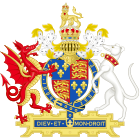 Wiki90
Wiki90
Wiki90: 90s Style Encyclopedia on the Web

|

|

|

|




Treasons Act 1534
In today's world, Treasons Act 1534 is a topic that has captured the attention of people of all ages and interests. From its impact on society to its influence on popular culture, Treasons Act 1534 has become a reference point in our lives. Whether we are discussing its implications in politics, its importance in history, or its relevance in the present, Treasons Act 1534 has proven to be a topic worth exploring in depth. In this article, we are going to analyze different aspects of Treasons Act 1534, from its origins to its current impact, with the aim of offering a complete and enriching vision of this topic.
| Act of Parliament | |
 | |
| Long title | An Act whereby divers Offenses be made High Treason; and taking away all Sanctuaries for all manner of High Treason. |
|---|---|
| Citation | 26 Hen. 8. c. 13 |
| Territorial extent | Kingdom of England |
| Dates | |
| Royal assent | 18 December 1534 |
| Other legislation | |
| Repealed by | Treason Act 1547 |
| Relates to | |
| Text of statute as originally enacted | |
The Treasons Act 1534 or High Treason Act 1534 (26 Hen. 8. c. 13) was an Act of the Parliament of England passed in 1534, during the reign of King Henry VIII.
Background
This Act was passed after the Act of Supremacy 1534, which made the king the "Only Head of the Church of England on Earth so far as the Law of God allows."
The Act
The Act made it treason, punishable by death, to disavow the Act of Supremacy 1534. Sir Thomas More was executed under this Act. It was introduced as a blanket law in order to deal with the minority of cases who would refuse to accept Cromwell's and Henry's changes in policies, instead of using the more traditional method of attainders.
The Act specified that all those were guilty of high treason who:
do maliciously wish, will or desire by words or writing, or by craft imagine, invent, practise, or attempt any bodily harm to be done or committed to the king's most royal person, the queen's or the heirs apparent , or to deprive them of any of their dignity, title or name of their royal estates, or slanderously and maliciously publish and pronounce, by express writing or words, that the king should be heretic, schismatic, tyrant, infidel or usurper of the crown...
The word 'maliciously' was added in several cases to require evil intent, and the Act meant that it was very dangerous to say anything against what the King had done. The Act also made it treason to rebelliously keep or withhold from the King his castles, forts, ships, or artillery, and to fail to surrender any of them within six days of being commanded to do so. It also abolished sanctuary for those accused of high treason.
The Treasons Act 1534 was repealed by the Treason Act 1547.
See also
 Treasons Act 1534
Treasons Act 1534 Ato de Traição de 1534
Ato de Traição de 1534 Treasons Act 1534
Treasons Act 1534

